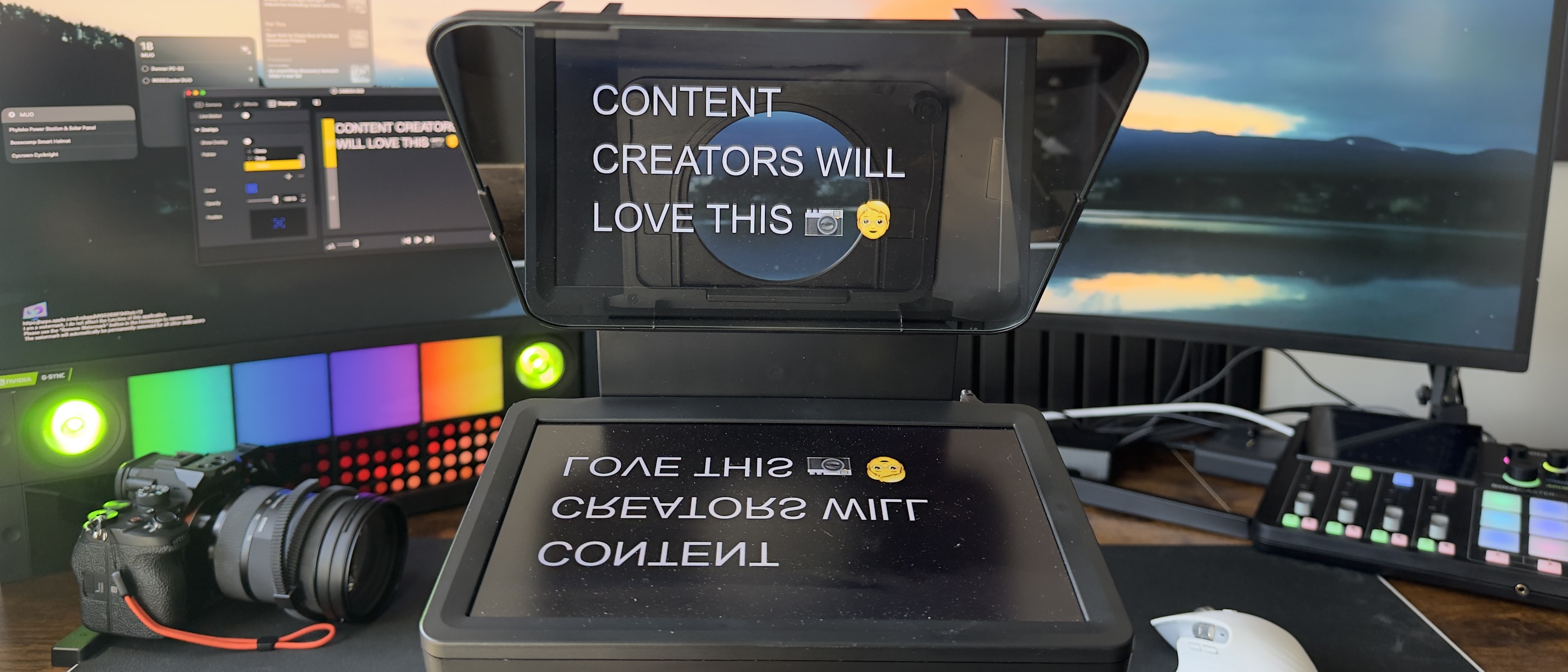Tom's Guide Verdict
Teleprompters don’t need to be bulky and time consuming to setup. The Elgato Prompter is what a modern teleprompter should look and function like. While it’s probably too small for larger productions, for creators like myself, it’s the perfect size and offers so much.
Pros
- +
Built-in display
- +
Works as a second display
- +
Plug and plug with one USB-C
- +
Supports wide range of cameras and lenses
Cons
- -
Small screen size
- -
Relies on a PC/Mac to work
- -
Software can occasionally be glitchy
Why you can trust Tom's Guide
The Elgato Prompter is the single most meaningful upgrade to my video studio this year. Thanks to its simple setup, it not only helps me produce videos faster, but I’m actually having more fun making them too which — when you’re on camera a lot —makes a big difference. Compared to a traditional teleprompter, it takes up way less space and only requires a few seconds to setup.
Now that I’ve tried it, I’m never going back. Here’s everything you need to know about the Elgato Prompter and how it helped level up my video content creation process.
Elgato Prompter: Cheat Sheet
- What is it? The Elgato Prompter is a versatile 9-inch teleprompter with an integrated screen that allows you to maintain eye contact with your camera while reading scripts or looking at anything on the display.
- Who is it for? The Prompter’s compact size makes it ideal for content creators, streamers, and small production teams looking for an all-in-one, easy-to-use teleprompter that doesn’t take up much space.
- What does it cost? The Prompter starts at $279.99, with bundles available that include additional accessories like the Elgato Stream Deck and mounting arms.
- What do we like? The Prompter is powered by and connects to your Mac or PC with a single USB-C cable. It’s small, doesn’t require a dedicated tablet, and it offers lots of customization.
- What don’t we like? The lack of a folding mechanism for better portability and its need for a host PC/Mac to run scripts are minor drawbacks that are hopefully addressed in a future release.
Elgato Prompter: The Ups
The Elgato Prompter is really helpful for those who frequently find themselves writing and then reading scripts on camera. It's easy to set up and start using, though you can also use its built-in display as a second monitor should the need arise.
Time and space saver

Making videos is already time consuming and stressful enough, and I’m always looking for ways to make things easier on myself. What used to take at least 10-15 minutes of setup with a traditional teleprompter now takes me under 30 seconds with the Elgato Prompter.
About a year ago, I began using teleprompters for my video reviews. Instead of trying to memorize and recite my scripts line by line or, worse, completely wing it and suffer for hours trying to edit the video down to something meaningful, my first Neewer teleprompter opened me up to a new world of speaking to the camera with more confidence and efficiency while still being able to maintain my natural presentation.
What I quickly realized, however, was that it was bulky, taking up way too much space in my small video studio, especially when not in use. Because of that, I found myself frequently tearing it down between each use and having to reset it up every time I wanted to use it. I'm someone who doesn't only "want" but rather "needs" to have things always ready to go when I want to shoot. Any additional setup time is another obstacle that I just can't afford. That Neewer prompter was becoming more of a hassle than I wanted, and I knew I needed to find a better solution.
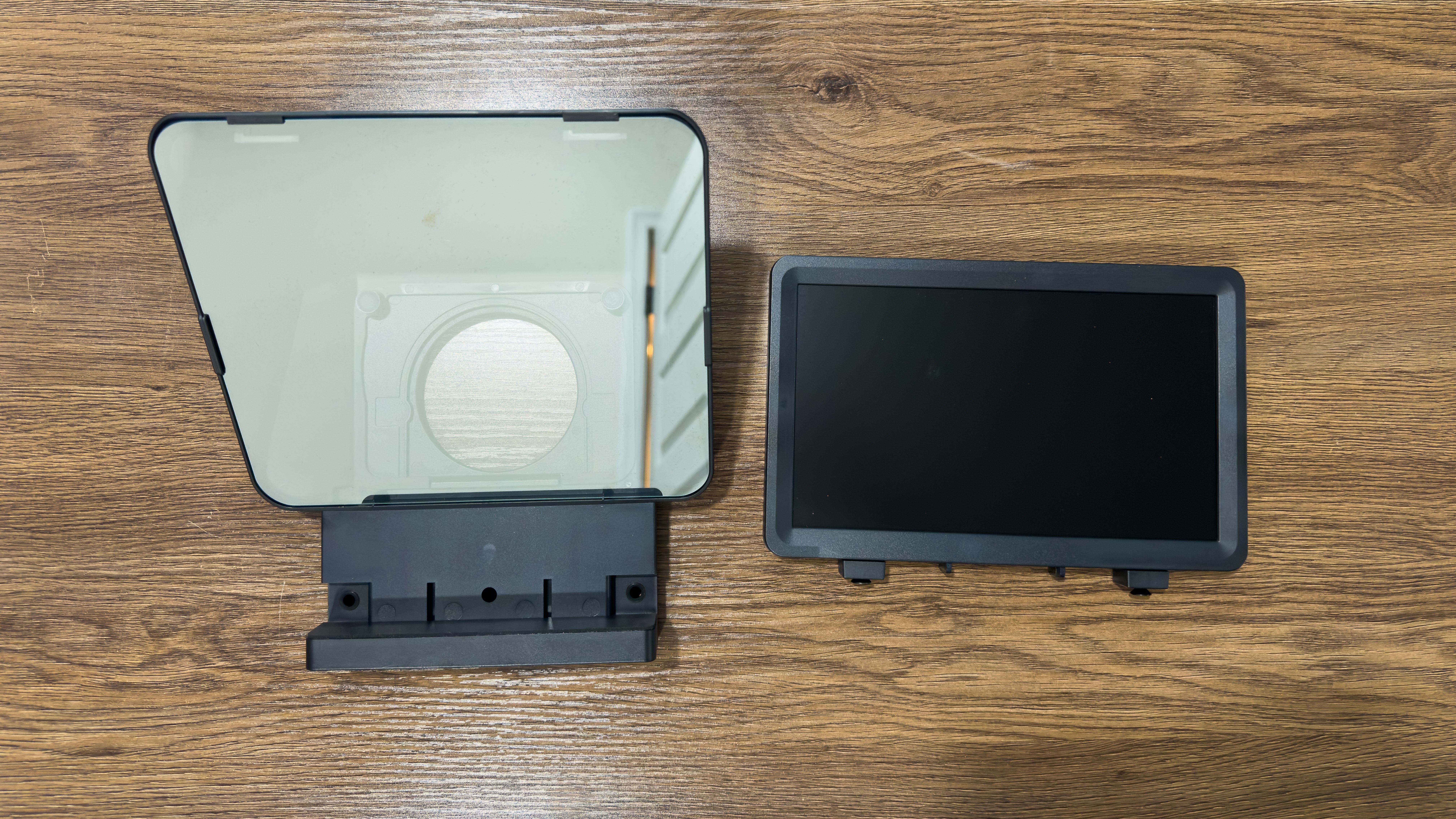
The Prompter makes things very simple with two main components - the 9-inch display and the beamsplitter glass that mirrors the display’s image so you can read it naturally while maintaining eye contact with the camera. You can change out its backplate to support a variety of webcams, phones, point and shoots, and DSLR cameras.
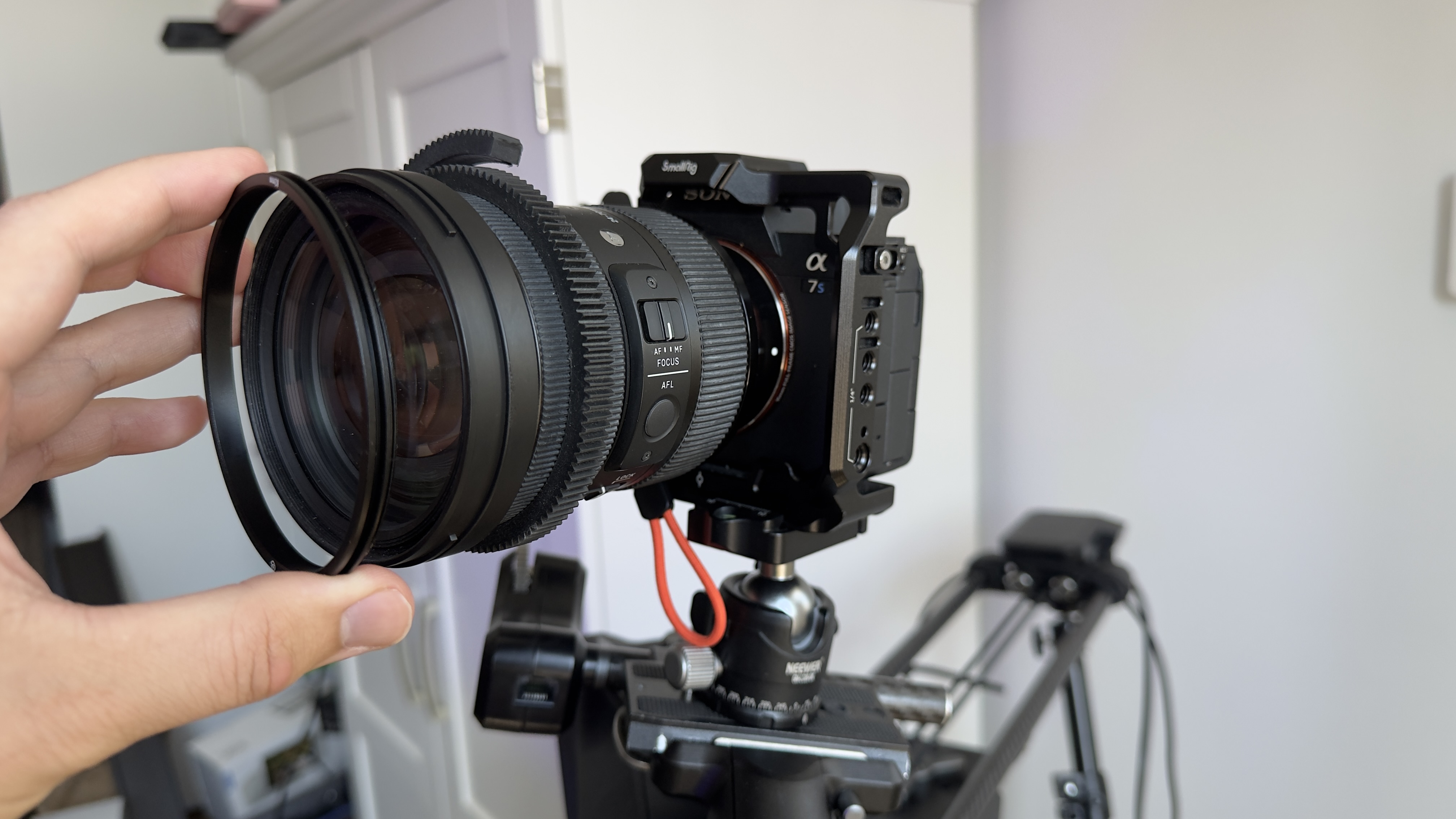
I prefer attaching it directly to the front of my camera lens using one of its included step up rings. Elgato includes nine in the box (49mm, 52mm, 55mm, 58mm, 62mm, 67mm, 72mm, 77mm, and 82mm) and I’ve been using the largest to support my Sigma 24-70 with my Sony a7siii. The only downside is that your standard lens cap likely won’t fit with this ring attached. It’s a minor inconvenience well worth the simplicity of sliding the Prompter on and being ready to shoot in seconds.
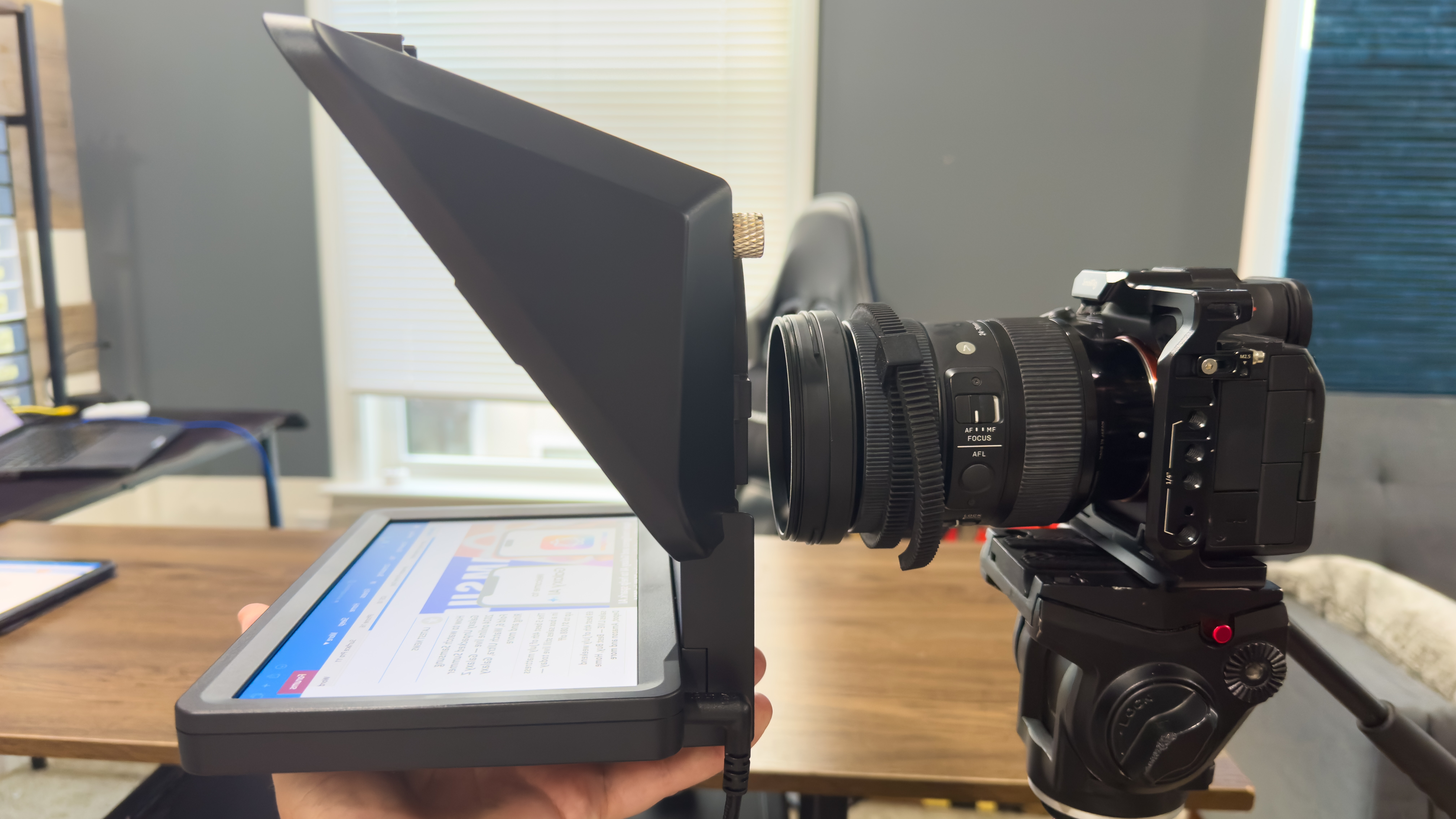
Weighing only 1.5 pounds, you don't necessarily need to support the prompter with its bottom ¼-inch thread using an additional tripod or arm. In my case, because of how frequently I’m taking this on the go or using it in a variety of setups around my studio, I simply quickly mount it on my lens and use a strong tripod on my camera. It couldn’t be easier.
Plug and play
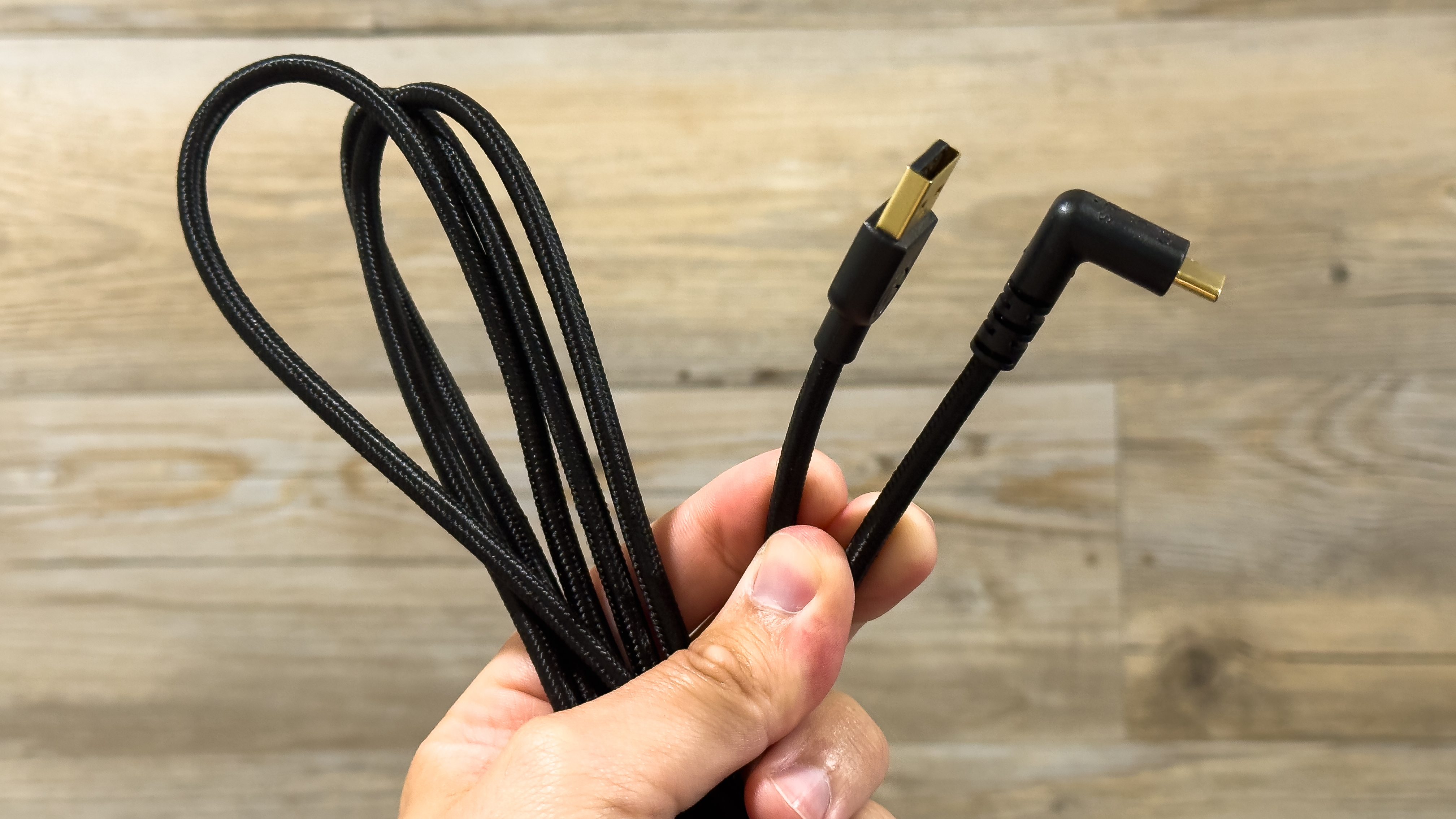
The other incredible thing is that the entire prompter is powered and connected using a single USB-C cable. On one hand I have to be mindful to not trip on this long cable if I leave it plugged in, but it all feels very modern. It took me only a few minutes of installing various Elgato drivers and software to get the prompter set up, but after that, it’s been as simple as plugging it into my MacBook Pro and it’s ready for me to record.
Since its screen is attached directly to the glass, it’s always perfectly aligned and I never have to worry about centering the screen’s position as I normally would if were using a tablet. Tied in with this, I also don’t need to use some janky teleprompter app which only works half of the time. Sure, there are a handful of decent apps out there, but it’s still a few additional steps to load the script in, pair a remote and get everything to look right.
While I can keep my mouse or keyboard out of the video frame to control my script, to really take the experience to the next level, I dug up an old Elgato Stream Deck Mini which had been collecting dust. Pairing the two allows me to quickly pause/resume my script, use auto-play, scroll back or forward, increase or decrease the font, and more. Although it’s another investment, I think the convenience the two offer together, even with an older model like mine, is well worth it if you record lots of videos.
Built-in display
Sure, it’s 9-inch 1024 x 600 px display isn’t impressive on paper, but how many other teleprompters double as a second monitor? Within the Elgato Camera Hub software, you can switch quickly between three content types: Display, which has the prompter function as a secondary display—a huge selling feature as this continues to be a super useful tool even when I'm not reading scripts giving me extra screen real estate; Text, where you import and make edits to your scripts; and Chat, which lets you connect your live stream chat so you can engage and maintain more natural eye contact without having to glance over to your monitor.
Where the magic happens
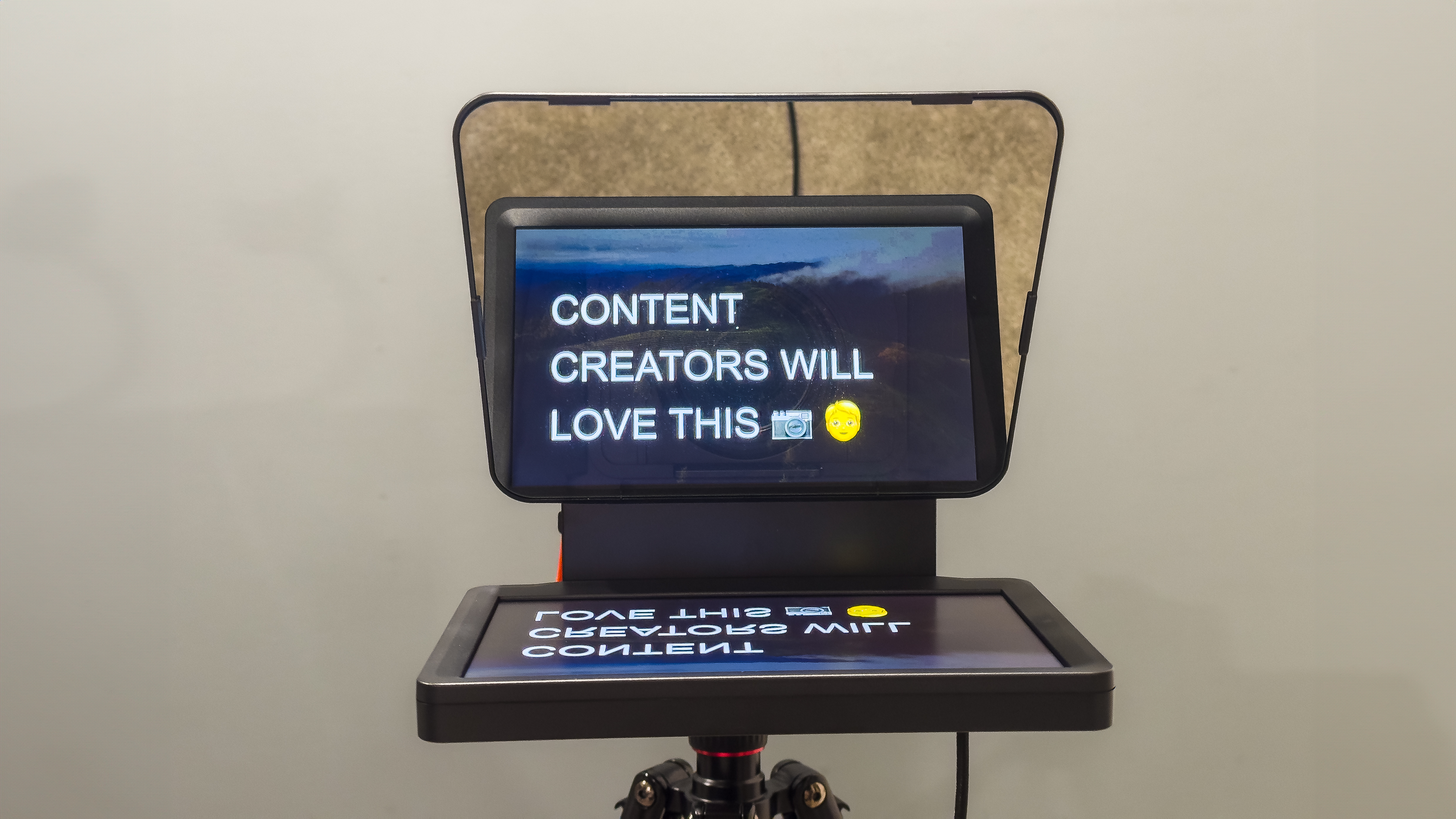
Even in its most basic function as a teleprompter, it does so many things better than a traditional one. In addition to supporting unique characters like emojis and various formatting for emphasis, I can also adjust the screen background and text to any color and even lets me adjust the background transparency so that I can still see what's happening behind the script on the secondary display.
Why does this matter? Let’s say I wanted to react or follow along with a video as I watching it real time while still referencing my notes. Maybe I’m in a Zoom meeting and I want to maintain eye contact but also have a cheat sheet of important points I want to bring up. I don’t have to glance down or to the side. It’s all right in front of me. Heck, I could even have a full show or game happening on screen and no one would be the wiser - that is of course until one too many out of place groans and hand gestures tip them off.
Elgato Prompter: The Downs
The Elgato Prompter has absolutely changed the way I shoot videos but that doesn't mean it's not without its downsides. The screen is smaller than a tablet, you can't fully break the device down and you do need to use it alongside a computer.
This might be too small
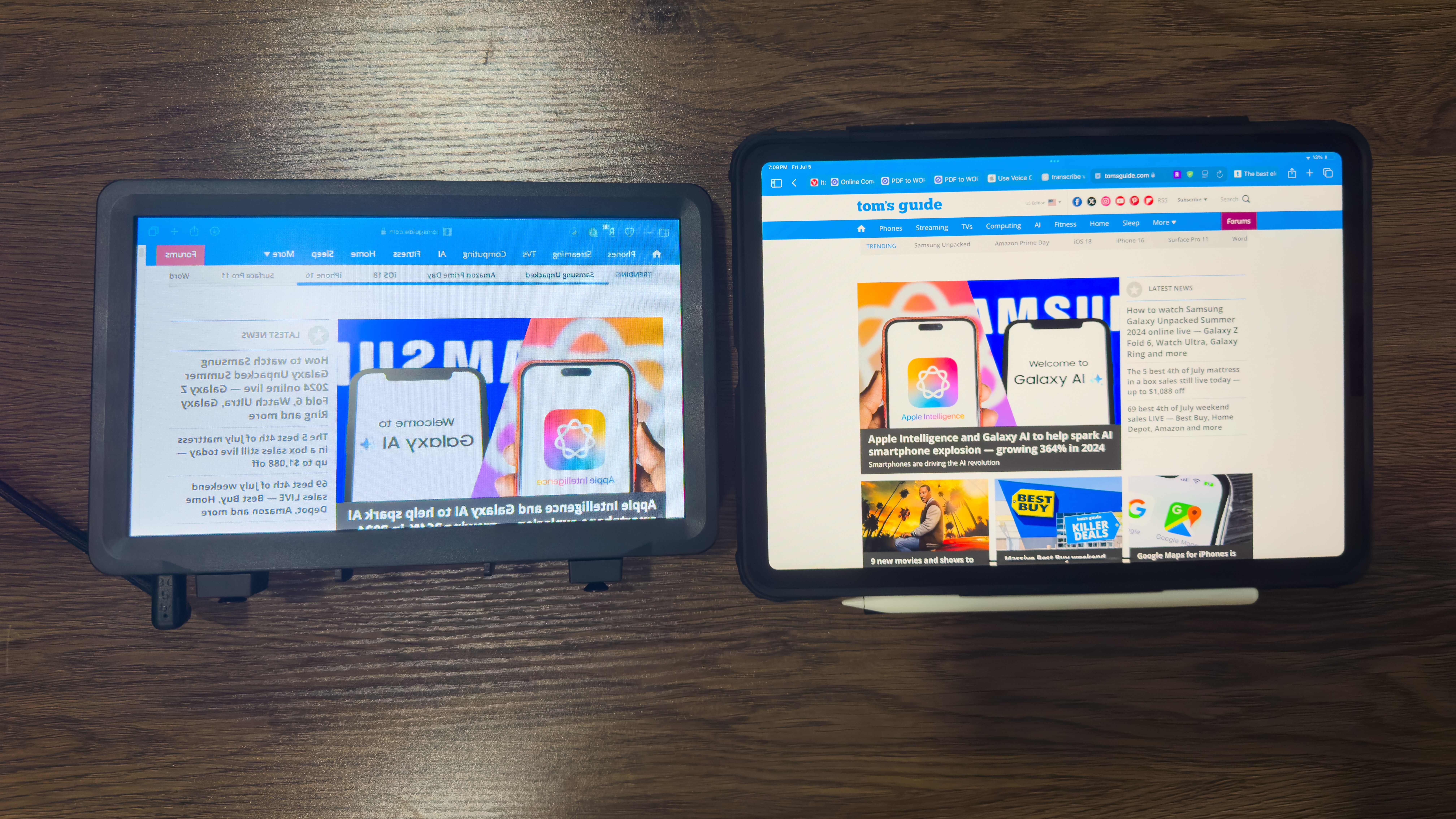
For most people, the biggest deciding factor on whether the Elgato Prompter is the right teleprompter for them isn't whether it's worth the cost, because again, with how feature-packed and smart this thing is, I think it's a bargain compared to everything else out there. Instead, it’s whether that 10-inch screen size is "big enough." For my studio and every other location I've used it, I'm usually no more than 5-6 feet away from it. You can see a size comparison to my 11-inch iPad Pro above.
I could push things further by increasing the font size, but by then, things become a little more cramped on screen, and it becomes a little more difficult to maintain that more natural tone, especially if you're like me and try to do intentional pauses or gestures as you speak—relying on having a bit more text on screen to read ahead and plan those out. With that, I think the Prompter is still best suited for individual creators or smaller productions, but because of this, I wouldn't be surprised if Elgato had a larger Prompter on the horizon. If Elgato ever releases a 14 or 15-inch version, it could completely dominate the entire teleprompter market.
Could be more portable
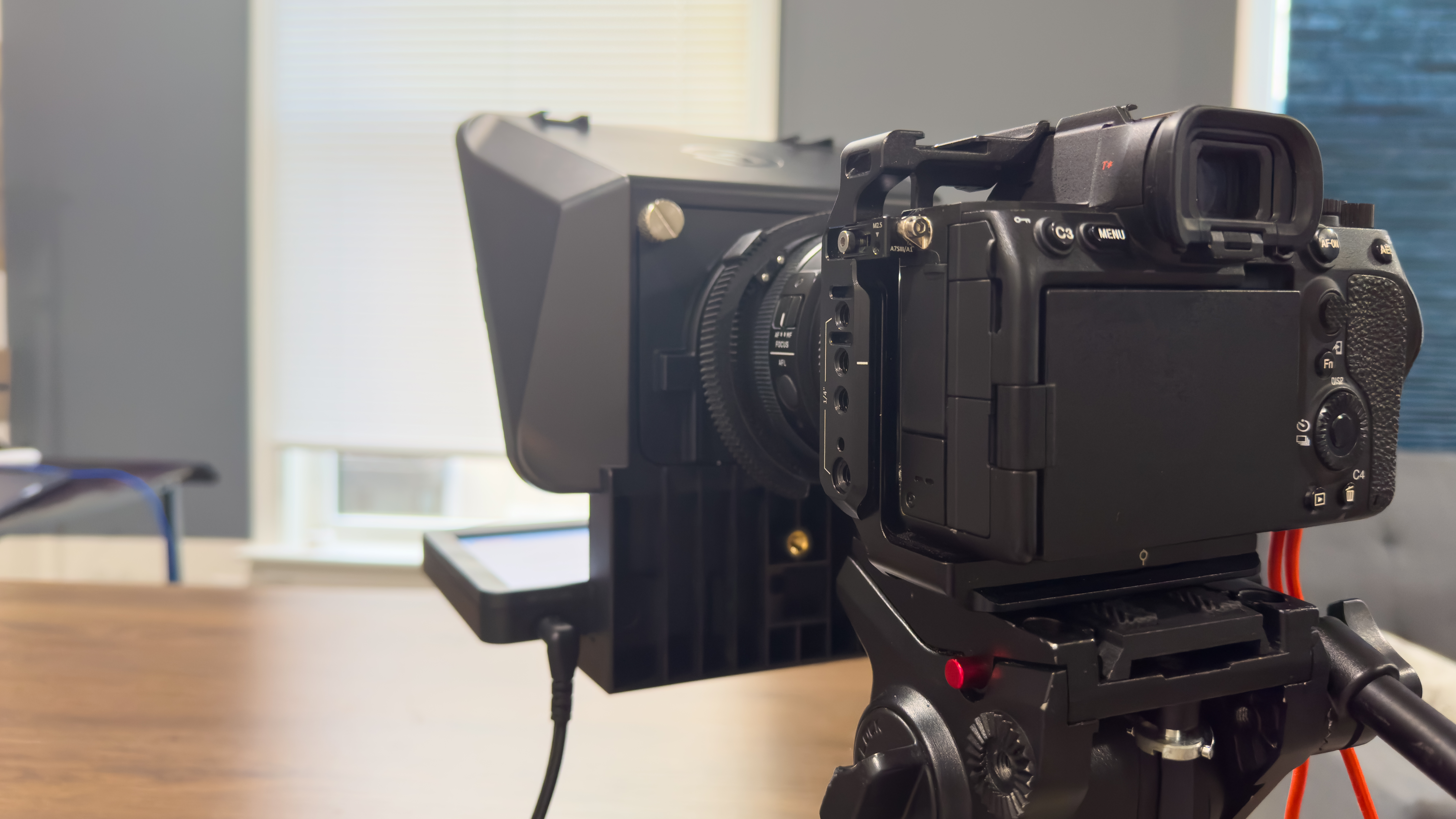
Despite being lightweight, it feels solidly built. However, one improvement I’d love to see is the ability for it to fold down. Currently, you can only remove the display from the glass reflector, which does make it significantly more compact, but that involves removing two screws on the back. Granted, this isn't difficult, but a folding mechanism would take this from a 9 or 9.5 to a perfect 10 for me.
In terms of taking it on the go, I’m still exploring ways to better pack and protect this when traveling. Currently, I wrap it in my clothes in my suitcase to keep it safe, but it would be great if Elgato came out with some kind of protective case that doesn't add bulk. Yet another reason why this thing needs to be able to fold down.
Not a standalone device
Due to how light and simple its setup is, I see the potential for how this could be used for more of a "run and gun" style of filming where I could potentially walk and have the camera following me all while I maintain the ability to read scripts in a more dynamic setting. However, what I quickly realized is that because the prompter relies on its USB-C cable not only for power but also for its brains, it’s currently limited to more static locations.
My million dollar idea is - what if Elgato made a "Pro" Prompter that could wirelessly communicate with your computer, or better yet, could have scripts uploaded directly to it and be played from the unit itself without needing any computer at all. If they could combine that with a built-in battery the Prompter would be an even bigger game changer than it already is.
Some minor bugs
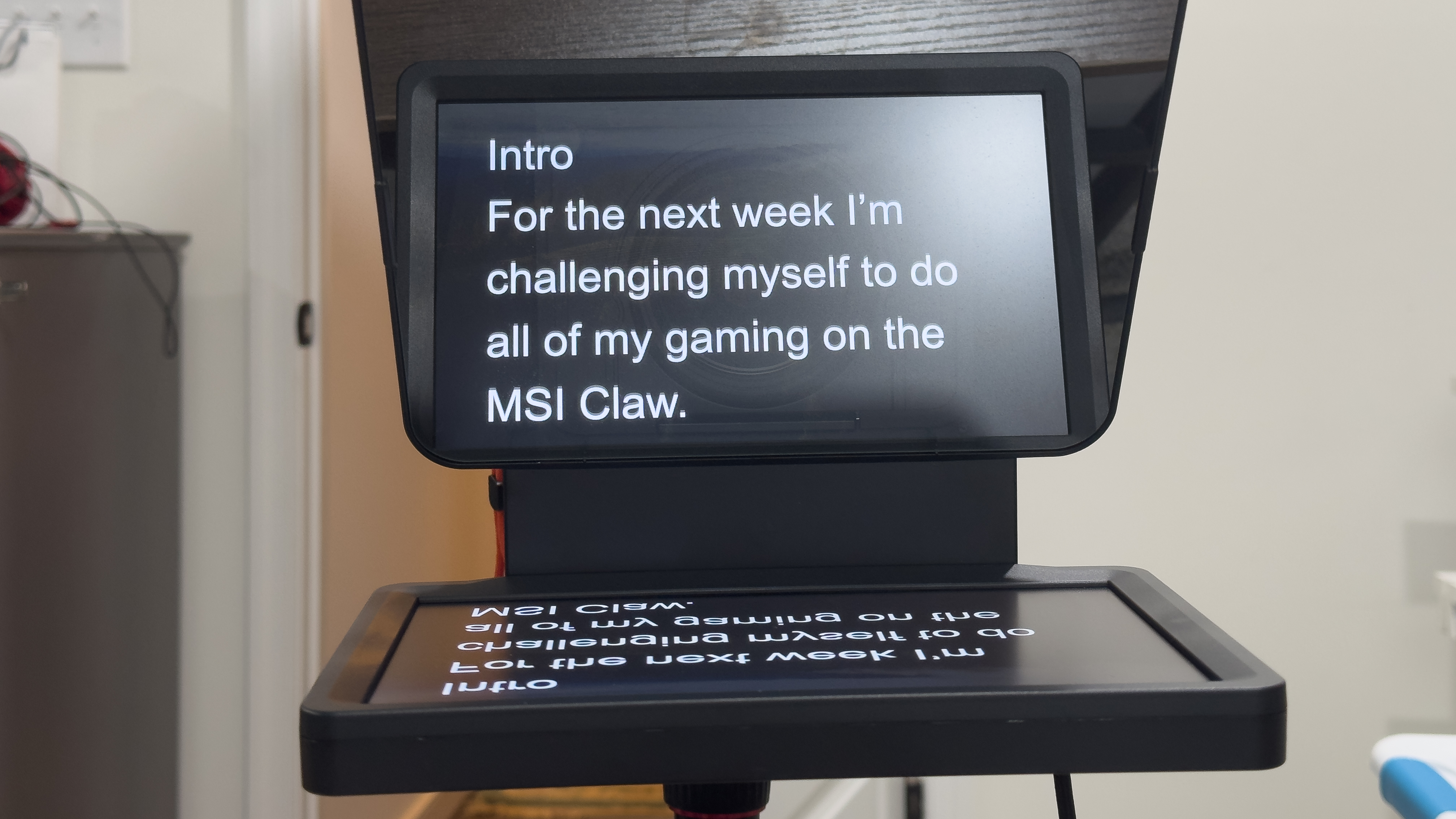
While I did occasionally run into some weird software-related glitches like my scripts endlessly looping certain sections, or being unable to change the speed, those bugs seem to have been quickly ironed out. A few weeks into my use, I never ran into them again.
One odd oversight I still am bothered by, however, is the fact that once it's connected, there isn't a true way to fully shut it down. You can turn the display "off" within the app, but in reality that only turns the screen to a black background, but it continues to be noticeably lit and still very much on. I'm sure there is a technical reason for this limitation, but at this time, it does mean I have to physically unplug the USB-C cable when I’m done using it.
Elgato Prompter: Verdict
Has the Elgato Prompter been worth the money? Definitely. I’m always looking for ways to up my production value and I think the Prompter has been an excellent investment. It helps me make videos faster, with more character, and I'm having more fun than ever doing since adding it to my workflow. It addresses nearly every complaint I have with traditional teleprompters all while introducing new features and possibilities that I would never have thought a teleprompter could do.
Its price may seem steep at $279.99, but when I consider that didn’t need to buy another tablet or any software to get it working, not to mention the time and effort it has already saved me, it’s been worth every penny. In just the few weeks of using it, the Prompter has become an essential part of my video production. If you're considering buying or upgrading your teleprompter, and you don’t mind its smaller size, this feels like a no-brainer.

Paul Antill is a Video Producer and Content Creator at Tom's Guide, specializing in video/audio recording, smart home technology, and laptops. His passion lies in making tech coverage not just informative but also fun and accessible to everyone answering the question “Why does this new product or feature matter to me?” Paul has been a tech host and video producer since 2019 where he has also covered major tech and gaming events. His love for tech and video began on his YouTube channel where for the low price of one subscription he shares head-to-head comparisons and clever ways to make the most of your gear. You can also see the behind-the-scenes and the magic that goes into our Tom’s Guide videos over on his Instagram. Paul graduated from the Mason School of Business at William & Mary, Williamsburg, VA, with a degree in Marketing and Business Analytics. When he's not on camera, you’ll probably still spot him behind one doing street photography and videography. Back home he’s probably in a heated Overwatch 2 match with his friends.
